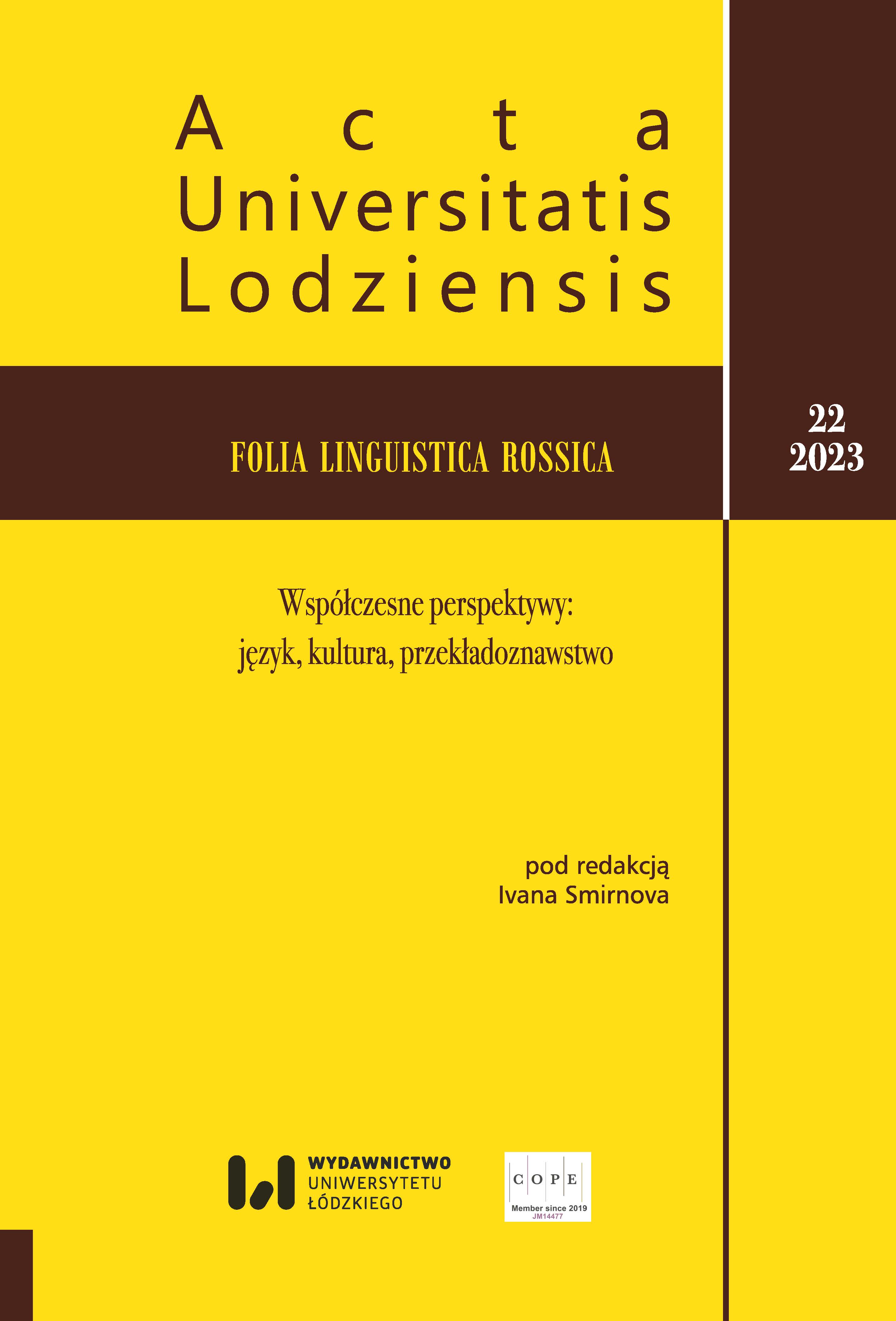Characteristics of Feminitives in Russian-Language Media Discourse
DOI:
https://doi.org/10.18778/1731-8025.22.05Keywords:
feminitives, word building, Russian, media discourse, media spaceAbstract
The article presents preliminary comments explaining the popularity of feminitives, and arguments regarding the reasons for the emergence of new forms in the Russian.
In the Russian-language media space there is a limited number of lexical units that are actively used and criticized by communicants. Newly emerged models of feminitives represent women whose activities are related to the media, the arts, and education. There are no professional qualifications related to working specialties successfully mastered by women. The unproductiveness of morphological transformations of new lexemes is the result of the use of a small number of acceptable suffixes at the disposal of discourse participants.
Feminitives of the new wave, as a means of struggle by participants in the feminist movement and active representatives of the blogosphere for the Russian-language media space, indicate not only the subject’s affinity for a certain professional activity, but also participate in marking a person’s gender. A factor slowing down the process of dissemination of feminitives in various media contents is a violation of consistency in the language, for example, the influence of accentological rules of the Russian on the creation of new lexical variants. Active participants in feminist movements laid down a conceptual framework that allows the use of a limited number of possible models of feminitives.
References
Анчимиук, O. (2020). Речевой этикет в произведениях русской литературы XIX века. Белосток.
Google Scholar
Батлер, Д. (2022). Гендерное беспокойство: феминизм и подрыв идентичности. Москва.
Google Scholar
Брайсон, В. (2021). Политическая теория феминизма. Москва.
Google Scholar
Волкова, Е.Ю. (2017). Что дала революция 1917 года в России? Вестник КГУ, 4, 275–277.
Google Scholar
Гузаерова, Р.Р. (2019). Блогер или блогерша: русские феминитивы с формантом ш(а) в современном медиапространстве. Ученые записки Казанского университета, 105–116.
Google Scholar
Жеребило, Т.В. (2010). Словарь лингвистических терминов. Назрань.
Google Scholar
Лаппо, М.А., Малиновская, Н.И. (2020). Параметризация базы данных узуальных и неузуальных феминитивов. Вопросы лексикографии, 18, 52–72.
Google Scholar
Лопатин, В.В., Улуханов, И.С., (2016). Cловарь словообразовательных аффиксов современного русского языка. Москва.
Google Scholar
Мазикина, Л. (2019). Малый справочник феминитивов. Екатеринбург.
Google Scholar
Смирнов, И. (2021). Метафора как механизм разрушения гендерных стереотипов. Вопросы семантики и стилистики текста: лингвистический дискурс, 61–70.
Google Scholar
Смирнов, И. (2022). Проблема гендерной идентичности в новелле «Легкое дыхание» И. Бунин. Slavia Centralis, 15, 249–262.
Google Scholar
Смирнов, И. (2022). Специфика языка миров Ивана Бунина. Lodz.
Google Scholar
Anchimiuk, O. (2020). Rechevoy etiket v proizvedeniyakh russkoy literatury XIX veka. Belostok.
Google Scholar
Batler, D. (2022). Gendernoye bespokoystvo: feminizm i podryv identichnosti. Moskva.
Google Scholar
Brayson, V. (2021). Politicheskaya teoriya feminizma. Moskva.
Google Scholar
Guzayerova, R.R. (2019). Bloger ili blogersha: russkiye feminitivy s formantom sh (a) v sovremennom mediaprostranstve. Uchenyye zapiski Kazanskogo universiteta, 105–116.
Google Scholar
Lappo, M.A., Malinovskaya, N.I. (2020). Parametrizatsiya bazy dannykh uzual’nykh i neuzual’nykh feminitivov. Voprosy leksikografii, 18, 52–72.
Google Scholar
Lopatin, V.V., Ulukhanov, I.S., (2016). Slovar’ slovoobrazovatel’nykh affiksov sovremennogo russkogo yazyka. Moskva.
Google Scholar
Mazikina, L. (2019). Malyj spravochnik feminitivov. Yekaterinburg.
Google Scholar
Smirnov, I. (2021). Metafora kak mekhanizm razrusheniya gendernykh stereotipov. Voprosy semantiki i stilistiki teksta: lingvisticheskiy diskurs, 61–70.
Google Scholar
Smirnov, I. (2022). Problema gendernoy identichnosti v novelle Legkoye dykhaniye I. Bunin. Slavia Centralis, 15, 249–262.
Google Scholar
Smirnov, I. (2022). Spetsifika yazyka mirov Ivana Bunina. Lodz.
Google Scholar
Volkova, E.U. (2017). Chto dala revolyutsiya 1917 goda v Rossii? Vestnik KGU, 4, 275–277.
Google Scholar
Zherebilo, T.V. (2010). Slovar’ lingvisticheskikh terminov. Nazran’.
Google Scholar
Downloads
Published
Versions
- 2024-02-29 (2)
- 2023-12-30 (1)
How to Cite
Issue
Section
License

This work is licensed under a Creative Commons Attribution-NonCommercial-NoDerivatives 4.0 International License.









